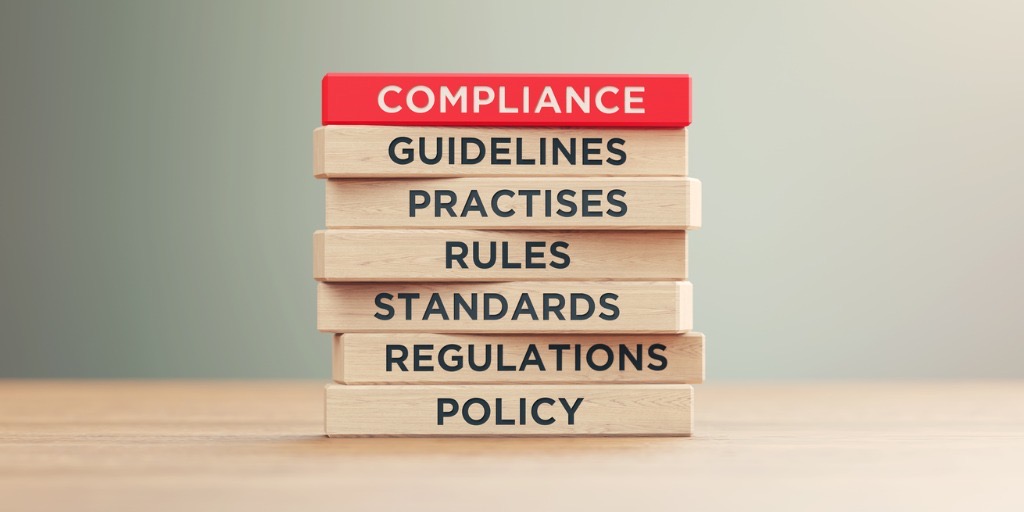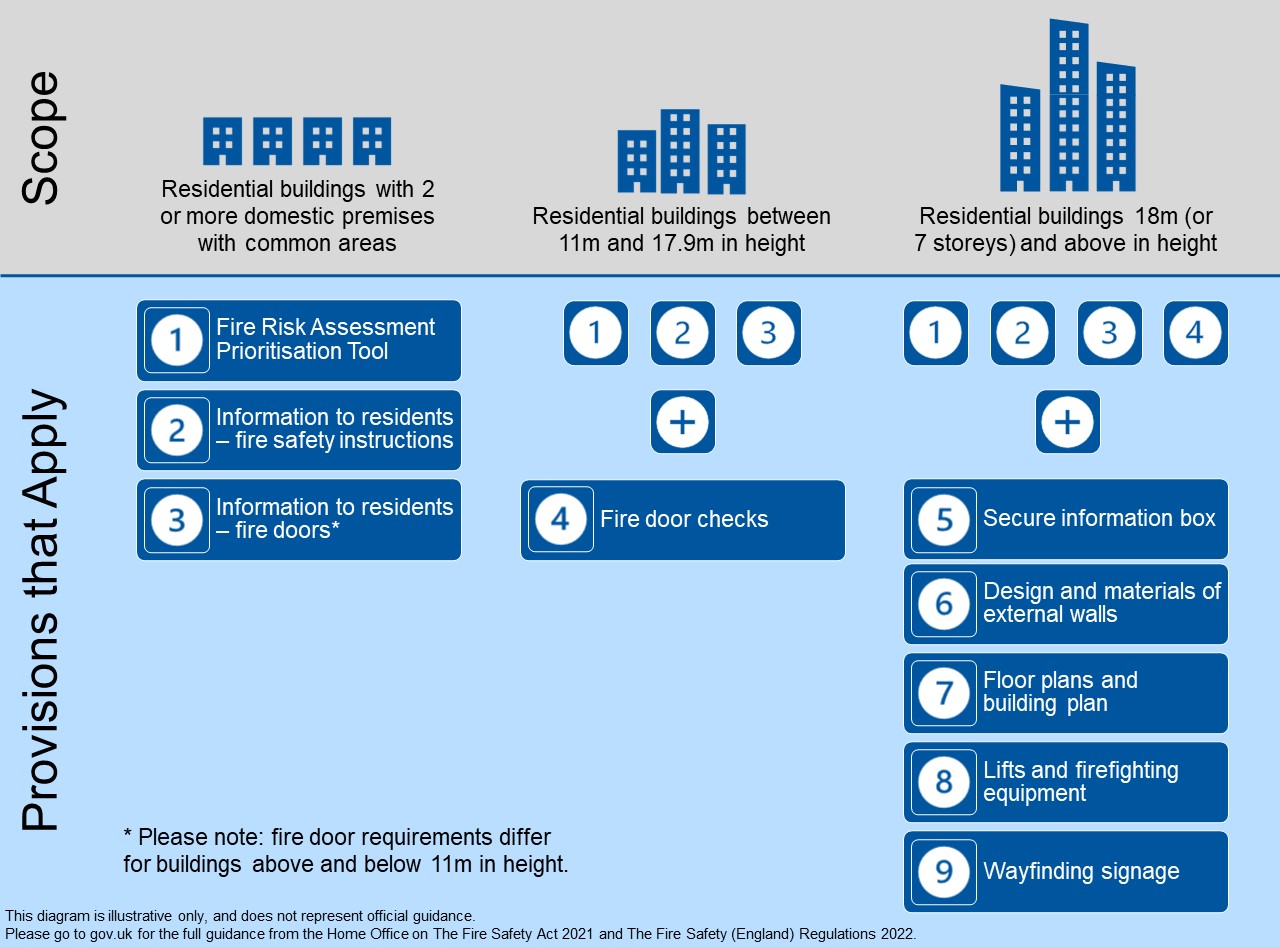
Fire Safety Legislation
Responsible Person:
Responsible person is the person ultimately responsible for fire safety in the premises.
Meaning of responsible person is explained in Article 3 of The Regulatory Reform (Fire Safety) Order 2005. In relation to a workplace the responsible person is the employer ( a person who has a control of the workplace).
In relation to any other premises the responsible person is the person who has a control of the premises such as managing agent or the building owner.
What must the Responsible Person do?
The Responsible Person must comply with The Regulatory Reform (Fire Safety) Order 2005. The responsibilities of responsible person are explained in Article 4 of the Order.
The Responsible person must ensure that preventive and protective measures are in place to reduce the risk of fire in the premises and to keep people safe from fire.
The Responsible person must carry out a fire risk assessment or appoint a competent person to undertake a fire risk assessment for the premises.
The Responsible Person must provide clear and relevant information on the risks identified by a fire risk assessment.
The Responsible Person must provide appropriate information and training to employees about fire precautions in the workplace. All staff, including part-time staff, zero contract staff, security staff, cleaning staff and contractors should be trained and instructed on how to prevent fires occurring and what to do if there is a fire.
In multiple occupancy buildings , the responsible must collaborate with other responsible persons when implementing preventative and protective measures and exchange information relevant to the risks in their premises.
Fire Safety Act 2021 and Fire Safety (England) Regulations 2022
The Act explains that where a building contains 2 or more sets of domestic premises, the Fire Safety Order applies to:
The Fire Safety Act 2021 commenced on 16th of May 2022. The Act clarifies that responsible persons (RPs) for multi-occupied residential buildings must manage and reduce the risk of fire for the structure and external walls of the building, including cladding, balconies and windows, and entrance doors to individual flats that open into common parts. The Act applies to England and Wales.
The building’s structure and external walls (including windows, balconies, cladding, insulation and fixings) and any common parts.
All doors between domestic premises and common parts such as flat entrance doors (or any other relevant door)
In relation to any other premises the responsible person is the person who has a control of the premises such as managing agent or the building owner.
The Act provides greater clarity on where the Fire Safety Order applies in multi-occupied residential buildings. RPs must manage and reduce the risk of fire for:
The structure and external walls of the building, including anything attached to the exterior of those walls, such as cladding, balconies and windows; and
Entrance doors to individual flats that open into common parts.
Responsible persons must review their fire risk assessments, to ensure they take into account the clarifications outlined in the Act. A fire risk assessment of buildings with two or more sets of domestic premises must be updated to take into account not only common parts of the building but also the structure and external walls of the building including anything attached to the exterior of those walls. A fire risk assessment must include all entrance doors to individual flats that open into common parts .
What new Regulations mean for the Responsible Persons?
As of 23rd of January 2023, responsible persons in multi-occupied residential buildings must take specific actions depending on the height of the building.
Some provisions apply regardless of height
More are needed once a building reaches 11 meters.
Further requirements are introduced when a building reaches 18 meters (or 7 storeys) or more.

Source: Fire Safety Act 2021 and Fire Safety (England) Regulations 2022: FAQs (nationalfirechiefs.org.uk)
In all multi-occupied residential buildings with two or more sets of domestic premises, responsible persons will be required to:
Fire Safety Instructions: provide relevant fire safety instructions to their residents, which will include instructions on how to report a fire and any other instruction which sets out what a resident must do once a fire has occurred, based on the evacuation strategy for the building.
Fire Door Information: provide residents with information relating to the importance of fire doors in fire safety.
In multi-occupied residential buildings of over 11 metres in height, responsible persons will be required to provide fire safety instructions and fire door information and additionally undertake annual checks of flat entrance doors and quarterly checks of all fire doors in the common parts.
In high-rise residential buildings (at least 18m or 7 storeys in height) , responsible person must provide fire safety instructions and fire door information, undertake annual checks of flat entrance doors and quarterly checks of all fire doors in the common parts. Additionally the responsible person will be required to:
Building Plans: provide their local Fire and Rescue Service with up-to-date electronic building floor plans and to place a hard copy of these plans, alongside a single page building plan which identifies key firefighting equipment, in a secure information box on site.
External Wall Systems: provide to their local Fire and Rescue Service information about the design and materials of a high-rise building’s external wall system and to inform the Fire and Rescue Service of any material changes to these walls. Also, they will be required to provide information in relation to the level of risk that the design and materials of the external wall structure gives rise to and any mitigating steps taken.
Lifts and other Key Fire-Fighting Equipment: undertake monthly checks on the operation of lifts intended for use by firefighters, and evacuation lifts in their building and check the functionality of other key pieces of firefighting equipment. They will also be required to report any defective lifts or equipment to their local Fire and Rescue Service as soon as possible after detection if the fault cannot be fixed within 24 hours, and to record the outcome of checks and make them available to residents.
Information Boxes: install and maintain a secure information box in their building. This box must contain the name and contact details of the Responsible Person and hard copies of the building floor plans.
Wayfinding Signage: to install signage visible in low light or smoky conditions that identifies flat and floor numbers in the stairwells of relevant buildings.
Please be aware , that new regulations will apply to existing buildings, and requirements for new buildings may be different.
Fire Safety Preparation and Training
To make sure that your business complies with fire safety legislation. Red Fire Safety can carry out a fire risk assessment to identify the potential risks and measures you can put in place to ensure that you comply with the legislation.
To find out more give us a call on 01689 493 641 or email info@redfiresafety.com today.
Enquire Today
To receive a fully comprehensive quote for your business, simply answer the questions and complete the form below and we'll be in touch.
Red Fire Safety are celebrating 20 years of successful trading!
This significant achievement speaks volumes about the quality of service and dedication that we have provided to our clients over the years.
Expanding across multiple counties and maintaining a strong presence in areas like London, Buckinghamshire, Surrey, Berkshire, Essex, and Hertfordshire demonstrates the trust and reliability that clients have placed in Red Fire Safety. Moreover, our ability to deliver projects across the UK showcases our commitment to meeting the needs of clients nationwide.
Our focus on knowledge, expertise, and efficiency in supporting businesses in both commercial and residential sectors with compliance and planned maintenance projects is what drives us to provide high-quality services while also ensuring a positive and friendly experience for our clients.
Here's to many more years of success and continued growth for Red Fire Safety!


.png)
.png)
.png)
.png)
.jpeg)
.png)
.png)
.png)
.png)
.png)
.png)
.png)
.png)
.png)
.png)
.png)
.png)
.png)
.png)
.png)
.png)
.png)